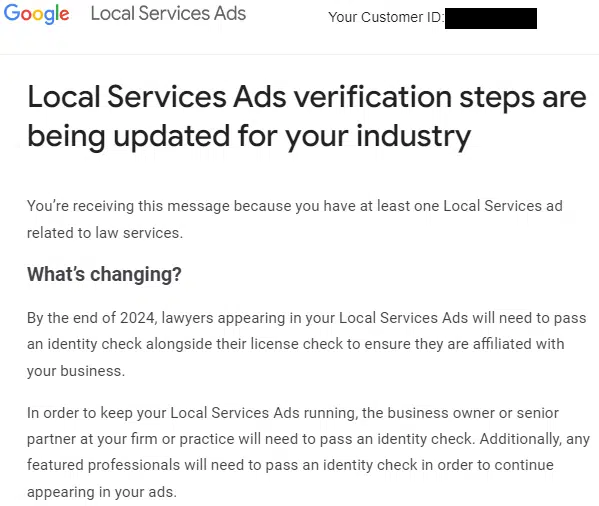Google is updating Local Services Ads verification process
The change is gradually rolling out in the U.S., beginning with smaller states and extending to larger states throughout the year.
Google confirmed it’s updating the verification process for Local Services Ads. The tech giant begun informing advertisers in specific sectors, like law services, about the update on March 4.
However, there are additional reports suggesting that a broader verification process update is in the works to address spam issues within the Local Services Ads (LSA) program.
What’s changing. Starting from the end of 2024, certain professionals featured in your Local Services Ads, such as lawyers, must undergo an identity check in addition to the license check to confirm their affiliation with your business, according to an email sent to advertisers by Google. To maintain the continuity of your Local Services Ads, the business owner or senior partner in your firm or practice must also pass an identity check. Moreover, any featured professionals will be required to undergo an identity check to continue appearing in your ads.
Why now? Google is updating its system to better protect against fake attempts to pose as licensed professionals, ensuring consumers are safe from impersonators.
Timeline. This change is being implemented gradually, starting with smaller states, and will progressively move to larger states throughout the year. Providers or featured professionals who need to take action to verify their identity should have already received an email with instructions on how to complete the verification process.
Google update emails. Anthony Higman, CEO of online advertising agency Adsquire, shared a preview of the email he received from Google on X:

Len Raleigh, President of Telapost SEO & Content Marketing, also reported receiving the same email on X.
Next steps. Affected advertisers will receive an email from Google seven days before the initiation of the identity verification process for their business. Once the identity verification starts, the business owner or senior partner and featured professionals will receive an email from Google’s verification partner, Evident, with additional instructions. If the business owner or a senior partner in the firm fails to pass the identity check within six days, their ad will cease to appear in search results. Similarly, featured professionals who do not complete identity checks within six days will no longer be featured in the ads.
More changes to come? Google began sending out verification update emails shortly after Corey Vandenberg, owner of marketing agency Clixsy, wrote on X that “big changes” were coming to LSAs. He posted:
- “Just spoke to our rep and there’s a new verification process about to roll out and if you don’t verify within 60 days you get kicked out. No details yet. Wait to hear precise instructions.”
- “We discovered because several clients profiles suddenly had no reviews. What had happened was our GBP team had changed the address and the LSA profile address was no longer an exact match.”
- “So this caused the GBP and the LSA linkage to disconnect entirely. That in and of itself is a pretty big discovery IMO. But the major rollout of a new, additional verification process seems like it could be the answer to Spam that so many of us have been waiting for from.”
Why we care. The upgraded verification process can protect your business from impersonator scams. If left unchecked, these scams may limit your campaign’s reach, resulting in fewer leads and a lower return on ROI.
What Google is saying. A Google spokesperson told Search Engine Land:
- “We are launching advertiser identity verification for legal professionals who use Local Services ads in the U.S. We will ramp up this rollout gradually in 2024, so some advertisers can expect to receive notices asking them to go through the verification process.”
- “This effort is intended to protect legal professionals from impersonators and also protect consumers from working with people who are bad actors.”
- “This is the first of efforts you can expect to see this year to protect consumers and advertisers from bad actors. This is the first of several steps we’ll take this year to improve protection for consumers and advertisers in Local Services Ads.”
Opinions expressed in this article are those of the guest author and not necessarily Search Engine Land. Staff authors are listed here.
Related stories
New on Search Engine Land